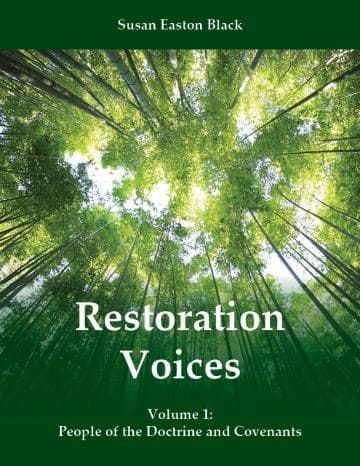Book
135 Chapters

1784–1854
D&C 55:6; 102:3
A few days after the June 3–6, 1831, conference in Kirtland, Ohio, the Lord revealed to the Prophet Joseph Smith that Joseph Coe was to accompany him and Sidney Rigdon to Missouri (see D&C 55:6). Joseph Coe accepted the revelation as the word of God and traveled with Church leaders to the western state. He was privileged to be in Independence when the Prophet “laid a stone at the Northeast corner of the contemplated Temple” and presided at the first conference in Missouri.[1] Two years later, acting as an agent for the Church, Joseph negotiated the purchase of the Peter French 103-acre farm. On that farmland, the Kirtland Temple was later built. Joseph also served on the Kirtland High Council from 1834 to 1837.
Of his contributions to the Church, Joseph Coe is best remembered for his $800 donation to the purchase of the Egyptian mummies and scrolls. Of exhibiting the mummies and scrolls, the Prophet Joseph Smith wrote in his journal on February 17, 1836:
This evening Elder Coe called to make some arrangements about the Egyptian records and the mummies, he proposes to hire a room at John Johnsons Inn and exhibit them there from day to day at certain hours, that some benefit may be derived from them— complied with his request, and only observed that they must be managed with prudence and care especially the manuscripts.[2]
After seven years of faithful service and devotion in the Church, in June 1837 Joseph Coe joined with Warren Parrish in claiming that Joseph Smith was a fallen prophet. Joseph Coe was excommunicated in December 1838. He never again affiliated with the Church. He remained in Kirtland, long after the faithful had moved onto Missouri.
A problem arose in the 1840s when Joseph Coe rented the Joseph Smith farm in Kirtland. Although he rented the farm knowing that the cost to him was ninety dollars a year plus taxes, he failed to meet the financial obligation, insisting “his part in the purchase of the mummies had never been repaid and that an agreement to do so with Joseph’s father through a gift of land had been ignored.”[3]
After receiving a letter from Joseph Coe indicating “a gift of land had been ignored,” the Prophet wrote to him on January 18, 1844:
I have received a letter from you . . . concerning some pretended claim you seem to think you have on the Mummies, and also requesting me to let you have the use of my farm for a longer Season &c, as a recompense for your interest in the Mummies. . . .
I am satisfied that you know you wrong me when you thus expose my property for sale for the Taxes, and at the same time are reaping the fruits of it. . . .
I have got your Deed, executed by your own hand, in due form for all the interest you ever held in the Mummies, and consequently don’t feel under the necessity of listening to such unjust claims.[4]
The Prophet denounced Joseph Coe’s lies:
It is astonishing that any man can be so wicked and corrupt as to suffer the property of his benefactor and best friend to be sold in order to defraud him out of it by getting a Sheriffs Deed, surely the shades of darkness prevail over such a man; his heart must be hard as the nether-mill-stone, and virtue have no place in him.[5]
Joseph Coe died in 1854 at age of sixty-nine.
[1] John Whitmer, History, 1831–circa 1847, 32. Joseph Smith Papers.
[2] Journal, 1835–1836, Historical Introduction, 157. Joseph Smith Papers.
[3] Letter from Joseph Coe, 1 January 1844. Joseph Smith Papers.
[4] Letter of Joseph Smith to Joseph Coe, 18 January 1844. Joseph Smith papers.
[5] Letter of Joseph Smith to Joseph Coe, 18 January 1844. Joseph Smith papers.
Book
135 Chapters
Items in the BMC Archive are made publicly available for non-commercial, private use. Inclusion within the BMC Archive does not imply endorsement. Items do not represent the official views of The Church of Jesus Christ of Latter-day Saints or of Book of Mormon Central.